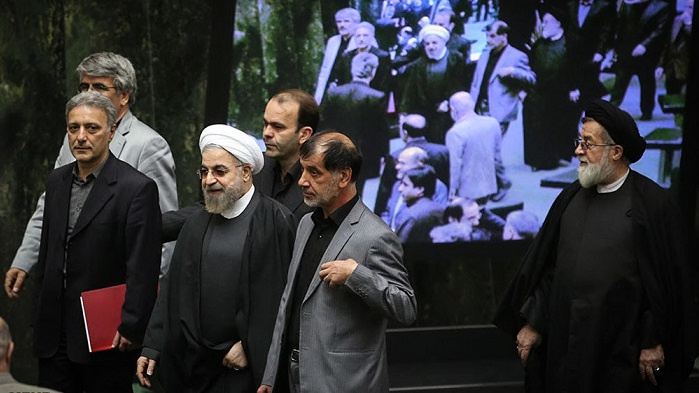Rouhani’s Cabinet Reshuffle Sparks Yeas, Nays, and Maybes

(Rouhani attending Majles to defend his candidate for Ministry of Higher Education, Jafar Meili-Monfared in October 2014. Source: Armin Karami/MEHR)
Iranian President Hassan Rouhani has accepted the resignations of the three ministers of culture, education, and youths and sport. This is the first reshuffle of his cabinet, coming less than seven months to go before the next presidential race in which Hassan Rouhani will seek reelection.
Culture Minister Ali Jannati, constantly targeted as a man of back-to-back retreats by reformist media and a lax defender of the Islamic Revolution red lines in cultural values (read more here), was the first of the three to resign. Then came Youth Affairs and Sports Minister Mahmoud Goudarzi’ letter of resignation. His lack of popularity started from the beginning of his tenure, as he was the fourth minister Rouhani proposed in a marathon of confidence votes with the ninth parliament. Education Minister Ali-Asghar Fani stubbornly remained in spite of an impeachment motion and insider pressure from the administration to leave job and was finally, as many said, forced to resign.
Even though rumors and speculations already had these ministers leave office, reports of the triple reshuffle shocked many, sparking yeas, nays, and maybes. While the administration prefers dubbing the reshuffle as ‘cabinet repair’, observers believe it was partly also the result of months of pressure from the far right.
To reformist politician Mohammad-Sadegh Javadi-Hessar, Hassan Rouhani has already let slip his chances of a win-win in the face of these pressures. However, the president will still have chances of avoiding a lose-lose if he succeeds in introducing more resistant, aggressive and astute stand-ins, Javadi-Hessar argues. “If the candidates proposed have pro-reform tags or at least known not as radical Principlists, it will be favorable for Mr. Rouhani and they will win Majlis’ vote of confidence. If those renowned as reformists are proposed, such as Mr. Najafi, they will win the parliament’s green and also boost ballots in the reformist vote base in favor of Rouhani,” Fararu quoted him as saying.
On the other end of the spectrum lie the hardliner Principlists, with their bellwether being Kayhan daily. Kayhan sees the Rouhani administration irreparable, the reshuffle a game not worth the candle, and the whole episode as a diversion for the public. The daily questions the substitution of culture-related ministers while the main public concern is the economy. “It is undeniable that even in these final months, the administration is concerned with the May presidential race instead of tackling the people’s pains and acting honestly. Its maneuvers are pretentions of agility and dynamicity,” it added.
Principlist politician Hossein Kanani-Moghaddam calls the reshuffle senseless, as little time is left for potential substitutes. Moreover, he implies that resignations of the kind are to evade accountability to the parliament. “If it is about the [ministers’] efficiency, it is up to the parliament to impeach and if it is about differences with the President and that they do not want to cooperate with a possible next administration, they should communicate the reason of their resignations to the public,” he told Fararu.
The reformists also had different views about the Rouhani administration both before and after the cabinet reshuffle. Days before the resignations, pro-reform MP Mahmoud Sadeghi had complained that Rouhani felt assured of support from the reformists and was thus playing ball with their rivals.
Fararu, a website said to be affiliated with Tehran Mayor Mohammad-Bagher Qalibaf, interprets the Rouhani initiative as a bid to boost ballots. According to Fararu, here lies the reason that Rouhani preferred to fix culture, not economy. “There are ministries that deal with the youths, artists, and culture-related strata, i.e. the middle class which is the main vote base for Hassan Rouhani,” Fararu wrote in an article published on Wednesday.
As the online outlet puts it, the plans proposed by Rouhani’s proposed minister could be seen as the manifest of the Rouhani reelection campaign. Such plans, many observers say, should not be short-term, but intended for the next four and half years, based on the supposition that Rouhani’s reelection is guaranteed. Former Transport Minister Ahmad Khorram and Elyas Hazrati are among those reformists that advocate the view. Hazrati also calls for substitutions in the administration’s economic team while former MP Ahmad Shirzad says the team’s record in controlling inflation and reducing interest rates is acceptable. Shirzad however makes a case that reforms should be considered on top of Higher Education Ministry, where Minister Mohammad Farhadi has failed to restore [political?] vigor in Iranian universities.
For the time being, the latest reports indicate that Mohammad-Ali Najafi is Rouhani’s candidate as the next Education Minister. The sitting director of Iran’s National Library Reza Salehi Amiri will be proposed to take over the Culture Ministry. Vice President of Iran and head of Cultural Heritage, Handcrafts and Tourism Organization Masoud Soltanifar will direct the Youth and Sport Ministry if he can obtain the parliament’s vote of confidence.

